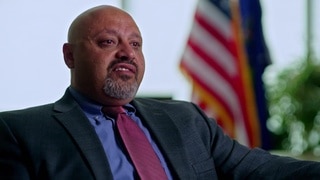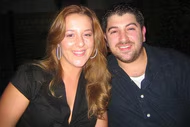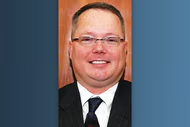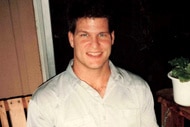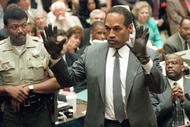Philadelphia-Area Police Corporal Fatally Shot By Teen He Was Mentoring
After Chester Police Department Corporal Michael “Mike” Beverly was murdered in Pennsylvania, investigators used a "radical maneuver" to track down his killer.
As a Chester Police Department supervisor, Corporal Michael “Mike” Beverly dedicated his life to safeguarding the residents of this Philadelphia suburb.
Tragically, on October 16, 2001, Beverly, 36, was gunned down in Highland Gardens, a crime-riddled neighborhood in Chester, Pennsylvania, that was run by a notorious drug gang.
Todd Nuttall, a now-retired Chester Police Department senior detective, recalled the slaying of his friend and colleague. “It was very devastating,” he said on Philly Homicide, airing Saturdays at 9 p.m. on Oxygen.
“You could tell that somebody intended to make sure that he was dead,” Nuttal added in the series' “End of Watch” episode.
The fact that it was eventually revealed that Beverly’s life ended in a brutal betrayal was even more shocking.
Who was Michael Beverly?
A Marine Corps veteran with a wife and five children, Beverly was born in Chester. His sister, Serena Lockett, remembered him as a “jokester” who set his mind “on doing something good.”
After college, Beverly became a police officer. “Mike always wanted to mentor kids in the community,” said his friend Darrell Rideout. “He was that kind of cop.”
Building bonds helps the community. “Mike thought that it was important to get these young kids to trust the police and not run away from us but run towards us if you need us,” said Dave Tyler, a now-retired detective with the Chester Police Department.
Michael Beverly's former partner had also been gunned down in Highland Gardens
At roll call on October 16, 2001, Beverly cautioned his squad to avoid Highland Gardens because officers were looking for a suspect.
“A lot of heat was going on there,” said Victor Heness, who was a Chester Police Department patrol officer at the time.
Beverly knew the dangers of the neighborhood. His best friend and former partner, Connie Hawkins, was killed in the line of duty there in 1993 when she responded to a call that he couldn’t take. Her death haunted him.
What happened to Michael Beverly?
On the night of October 16, 2001, a call went out for an officer down in Highland Gardens. Beverly was found lying on his back in the street near his car.
“Pulling up to the scene, was a sight of terror," Heness said. "...We could see multiple bullet holes in his face as well as his chest, and knew he was dead at that point. But we were still continuing to call out his name."
The neighborhood was locked down and the crime scene was processed. Beverly’s family and friends were shocked. “It was a terrible day,” said Lockett.
Who are the Boyle Street Boys?
Now-retired FBI Special Agent Raymond J. Carr told Philly Homicide his reaction to Beverly’s murder. “I’m thinking, ‘I know who these S.O.B.s are that did this,’" Carr said. "It was the Boyle Street Boys.”
The violent street gang had a monopoly on the sale of cocaine and a stranglehold over Highland Gardens. “They had no problem with... killing you,” Nuttal said.
Detectives believed that Beverly had gone to Highland Gardens that night because he was investigating the murder of Tracy Saunders, a young mother and federal witness.
Saunders was shot hours before she was to testify against one of the Boyle Street Boys in a federal gun case.
A confidential informant had told Beverly that Brian Rogers, a gang leader, did the hit to stop her from talking, according to Philly Homicide.
Chester police suspected that Rogers may have also killed Beverly, and they canvassed the neighborhood. No one would talk, out of fear of gang retaliation.
After getting a tip to his whereabouts, Rogers was questioned. He denied killing Saunders and Beverly and had to be released.
What Michael Beverly’s phone records revealed
After reviewing Beverly’s phone records, detectives learned the real reason he’d gone to Highland Gardens. He’d gotten a call from the mother of Maurice Day, an 18-year-old he was mentoring.
“She’d spoken to him about trying to keep her son from joining the gang,” said Philly Homicide host Chris McMullin, who has decades of experience working various police departments in and around Philadelphia. Beverly had stepped up to keep Day on the right path.
Beverly’s body was found near the Day home. Day denied being involved in Beverly’s murder. He claimed he was with his girlfriend at the time of the shooting. The young woman confirmed that. Day was cleared as a suspect.
A tip from an informant led investigators to an abandoned building, where they recovered a 44-magnum revolver.
It was determined to be the gun that killed Beverly. No prints or DNA evidence were found on the weapon.
A “radical” move to get people to talk
Months passed and the case stalled. Because Highland Park was in a grip of fear, police faced a wall of silence.
“We understood that if you lived in that community, the price for cooperating with us was death,” said Faithe Moore Taylor, a former Assistant U.S. Attorney of the Eastern District of Pennsylvania.
Federal and state law enforcement devised a “radical maneuver," McMulllin said.
They “knocked on every single door in the neighborhood and served subpoenas to anyone that was there,” said now-retired DEA special agent Randy Updegraff.
Every witness was required to appear in Philadelphia in a safe space where they could speak without fear.
“People were overjoyed that they could be lost in the crowd, and that was the goal,” said Taylor.
A break in the case
After 10 long months of interviews, the innovative strategy paid off. A witness identified Rogers as the man who murdered Saunders. “It was an execution,” said Carr.
In a surprising twist, Rogers eventually turned himself in. He admitted his role in killing Saunders and was arrested.
But he staunchly denied shooting Beverly and refused to name the officer’s killer, obeying the street code of silence.
“It was always, ‘Do not talk to the police. Snitches get stitches,'" Nuttal said.
RELATED: Abigail Williams and Liberty German's Final Moments Detailed in Delphi Murders Trial
Who killed Chester Police Department Corporal Michael Beverly?
A year after Beverly’s murder, detectives continued to dig deep. One of Nuttal’s sources informed him that Maurice Day, the teen Beverly was mentoring, had confessed to him that he’d killed the corporal.
Day was apprehended and brought in for questioning. He denied killing Beverly. Detectives re-interviewed Day’s girlfriend who’d originally backed up his alibi for the night of the murder. This time, she admitted he wasn’t with her all night.
As Day’s alibi fell apart, a woman came forward with an eyewitness account of Beverly’s murder. “She saw Maurice Day shoot and kill Michael Beverly,” said Nuttal.
“We were subpoenaing everyone, and all of a sudden they weren't afraid that these guys were going to hurt them,” said Taylor. “It was as successful as we could have possibly hoped.”
Day was taken into custody and investigators pieced together his motive. “Maurice Day would do anything and everything to be part of the Boyle Street Boys,” Tyler said.
In the weeks leading up to the trial, Rogers claimed that Day previously admitted that he killed Beverly. To avoid a life sentence for the murder of Tracy Saunders, Rogers agreed to testify against Day.
Maurice Day guilty of Michael Beverly's murder
Day was found guilty of first-degree murder. He was sentenced to life in prison without the chance of parole. Rogers was sentenced to 42 years in prison for Saunders’ murder.
“Ten more of the Boyle Street Boys received stiff prison sentences on drug and gun charges,” said McMullin. “The gang that had terrorized Highland Gardens for so long is now decimated.”
To learn more about these two murders cases, tune in to the “End of Watch” episode of Philly Homicide, which airs Saturdays at 9 p.m. on Oxygen.
